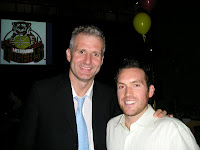
I haven't written anything about the NBA Finals this year.
I think everyone who followed the games may have had a similar feeling of inevitability about the impending result.
It was hard to get excited. Certainly not the Celtics V Lakers of 2008, or the Kobe V LeBron that everyone expected this year.
One person that is always intriguing to me however is Kobe Bryant.
He's like my beloved Magpies, you feel like you should love him or hate him.
Bill Simmons generally feels the later. In his lengthy article below he goes into great depth about the Finals of 09 and the Finals MVP #24.
http://sports.espn.go.com/espn/page2/story?page=simmons/090616&sportCat=nba
I have cut out just an extract of more than a couple of interesting things about Kobe and the finals.
"Again, the lightning rod here is Kobe. If you want to play the "We'll Never See Anyone Like Him Again" card, you're probably right ... but not for the reasons you might think. He grew up atypically from most NBA stars, the only male child of a successful professional player, someone who never had to worry about money and even spent seven formative years abroad (in Italy). The Lakers acquired him when he was 17. He started an All-Star Game when he was 19. He signed a $71 million contract when he was 20. He married when he was 22. He won three titles by the age of 23. He became a father at 24. He also became the most polarizing figure in sports at 24, thanks to whatever happened in Eagle, Colo. The next four years were awkward as hell -- the league's most gifted player struggling on a series of forgettable teams, the most-discussed athlete in any sport, someone who learned to feed off constant negativity much like Barry Bonds did -- before fate intervened in October 2007, when a trade to Chicago fell through and Gasol/Ariza were gift-wrapped for Los Angeles a few months later. The rest is history.

Watching from a distance, what stood out (and still does) was how alone Kobe seemed during that stretch. Unlike Jordan, Shaq, Manning or Tiger, we never saw his parents in the stands. Unlike LeBron or Brady, we never heard about his close-knit group of buddies who had his back and attended every game. Unlike Duncan, Nash, Barkley, Favre or Magic, we never felt like his teammates doubled as his buddies. Unlike Bird, Kareem or Jordan, there wasn't a mystique that went with him, an undeniable force of personality that set him apart.
Who did Kobe have? His wife, his daughters and his agent. That's it. During Sunday night's celebration, when Kobe's family materialized immediately -- almost on cue -- the cynical side of me wanted to throw up, but the rational side was thinking, "Of course, they're here. He doesn't have anyone else." I wouldn't call the situation weird or anything, just atypical for a league in which stars normally surround themselves with longtime friends who knew them before they were famous. And it fits in with the rest of the Kobe package: He's an unconventional superstar in a conventional league. Almost like a successful child actor who beat the odds and turned out relatively normal.

Two months ago, I wrote that Kobe made a mistake playing in the 2008 Olympics because his biggest threats (LeBron, Paul, etc.) were given a glimpse into what made him him -- how hard he worked, how committed he was, how he was consumed by basketball -- and argued that he inadvertently gave away a competitive advantage. When I mentioned this theory to colleague and longtime Kobe expert J.A. Adande during a recent podcast, Adande respectfully disagreed, saying Kobe NEEDED that experience. He needed to fit in with that crew. He needed to be accepted as one of the guys. He craved that social respect from his peers. He wanted to crack jokes, bust chops and everything else. He would absolutely do it again, Adande maintained.
Listening to the argument, I joked Kobe sounded like one of those high school seniors who killed herself finishing with a 4.0, running the newspaper and the yearbook and playing three sports, and only realizing right at the end that she had never bothered to develop any lasting relationships. Like Ione Skye in "Say Anything," actually. But Adande was right. Kobe was making up for lost time. Most superstars prove themselves statistically on inferior teams, work up a healthy hunger for winning and getting over the hump, then make all the necessary sacrifices to make that happen. Kobe went in reverse -- he enjoyed team success early without ever establishing his statistical chops, leading to some serial ball-hogging, four scoring titles and even an 81-point game. After that, maybe he realized there was a better way and awkwardly reinvented himself from there. A little like watching A-Rod, actually -- another "child athlete star" -- only Kobe learned to play the part and A-Rod still can't figure it out."





